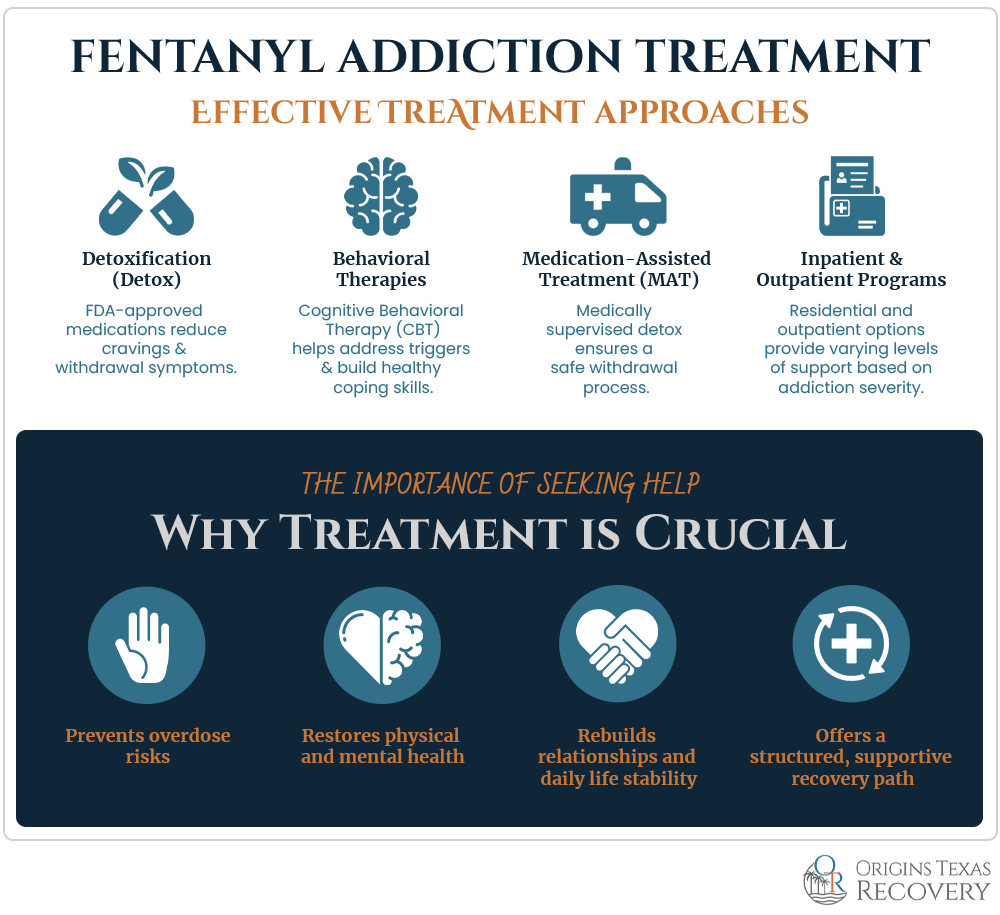Fentanyl Rehab Center in Texas
Here, we’ll explore why fentanyl is so dangerous, how to recognize the signs of addiction, and how Origins Texas Recovery can help you or your loved one find a path to healing and a healthier future. Understanding fentanyl addiction is the first step toward a life of recovery—and we are here to help you take it. Effective drug addiction treatment provides the structured support, medical expertise, and therapeutic approaches needed to guide individuals toward lasting sobriety and wellness.

What is Fentanyl?
Unfortunately, fentanyl’s potency—up to 100 times stronger than morphine—makes it the deadliest opioid on the market today, even surpassing heroin. Even a tiny miscalculation in dose can lead to overdose or death, as the margin between a therapeutic and a lethal dose is extremely small. Fentanyl misuse, including the use of illicit street forms such as powders, counterfeit pills, and patches, greatly increases the risk of accidental overdose and other serious health consequences. The drug is also highly addictive, and misuse often leads to physical dependence and opioid addiction, making it difficult for users to stop without help. In the wrong hands, fentanyl’s risks far outweigh its benefits, highlighting the need for awareness and caution when dealing with this powerful substance.

Signs and Symptoms of Fentanyl Abuse
- Physical Dependence: A person addicted to fentanyl may experience fentanyl withdrawal when not using the drug, which can involve severe fentanyl withdrawal symptoms such as sweating, muscle aches, nausea, or anxiety. They might also develop a tolerance, requiring increasingly larger doses to achieve the same effects.
- Behavioral Changes: Addiction often causes noticeable shifts in behavior. A person might isolate themselves, neglect personal responsibilities, or engage in risky activities to obtain the drug.
- Cravings and Loss of Control: A strong urge or compulsion to use fentanyl, even when knowing the harmful consequences, is a hallmark sign of addiction. The inability to cut back or stop using the drug is another clear indicator.
- Drowsiness or Sedation: Fentanyl users may appear excessively sleepy or lethargic, struggling to stay awake or maintain focus.

Other symptoms may include slurred speech, confusion, mood swings, and a persistent preoccupation with obtaining and using fentanyl. Individuals with substance use disorder may experience a wide range of fentanyl withdrawal symptoms and require tailored support. If you or someone you know is showing these signs, it’s essential to seek professional help immediately, as fentanyl addiction can quickly escalate into a life-threatening condition. Addressing individual needs is crucial when seeking help for fentanyl addiction.
Contact Our Admissions Team Today
What Are the Side Effects of Fentanyl Addiction?
Short-Term Effects of Fentanyl Abuse
Though it can offer pain relief, the immediate effects of fentanyl use can be both intoxicating and hazardous, especially when taken without medical guidance. These include:
- Drowsiness and Sedation: Users may feel excessively sleepy or lethargic, impairing their ability to function or respond to their environment.
- Euphoria: Fentanyl’s potent effects on the brain can create a temporary feeling of intense happiness or relaxation, which is a major factor in its addictive potential.
- Confusion: Users often experience mental fog, difficulty concentrating, or impaired judgment, making everyday tasks challenging and unsafe.
- Respiratory Issues: Fentanyl slows down breathing to dangerous levels, which can quickly lead to life-threatening situations, including coma or death.
- Nausea and Vomiting: These are common side effects, often making the user physically ill soon after consuming the drug.
Although the short-term effects may seem manageable at first, they set the stage for more severe consequences as dependency grows.
Long-Term Effects of Fentanyl Abuse
Prolonged fentanyl use exacerbates its harmful impact, leading to lasting damage that can be difficult, or sometimes impossible, to reverse. Long-term effects include:
- Chronic Respiratory Issues: Over time, fentanyl abuse weakens the respiratory system, leading to persistent breathing problems and an increased risk of respiratory failure.
- Mental Health Decline: Users often develop severe anxiety, depression, and paranoia, which can worsen as the addiction continues.
- Weakened Immune System: Long-term use makes the body more vulnerable to infections and illnesses.
- Organ Damage: Repeated fentanyl exposure can strain vital organs like the heart, liver, and kidneys, potentially leading to permanent damage or failure.
- Addiction and Dependency: The brain’s chemistry changes significantly with prolonged fentanyl use, making it nearly impossible to stop without medical intervention.
When fentanyl is used in combination with alcohol, the risks of respiratory depression, organ damage, and fatality are significantly increased. The long-term effects not only diminish the quality of life but also greatly increase the risk of substance abuse-related death.
Testimonials
![]()
![]()
![]()
![]()
![]()
Victoria H
I couldn’t recommend Origins more, I first attended their IOP program, then their residential program in South Padre. I’m writing this today a year and a half sober and going strong. Origins has literally saved my life in more ways than one.
![]()
![]()
![]()
![]()
![]()
Emily W
The clinicians are knowledgeable and skilled in a way that is always helpful and never harmful. This program brought me lasting healing and freedom.
![]()
![]()
![]()
![]()
![]()
Mary L
I cannot say enough about Hannah’s House. I entered broken, tired and far more sick than I realized. I was treated with kindness, love, patience and respect by all. I was so frightened to go but sad to leave, that speaks volumes. Thank you from the bottom of my heart to all who put me back together, I am eternally grateful.
![]()
![]()
![]()
![]()
![]()
Jack W
I struggled with my sobriety for over 5 years, but they were able to help me through the 12 steps of AA. I have been sober ever since my experience here. I’ll be hitting 2 years of sobriety in 22 days, thanks to this treatment center. No matter where you go, it’s all about your level of commitment towards gaining a better life ?
![]()
![]()
![]()
![]()
![]()
Jazmine R
Origins was exactly what I needed. The staff were incredibly knowledgeable, compassionate, and helpful. They come with years of experience and consider each individual they’re helping. If you’re looking for a facility that will truly care as much as you/your parents do, or are desperate for a miracle — I can’t recommend Origins more! ❤️
Why is Fentanyl Use Dangerous?
Due to its potency, even a small amount of fentanyl can be lethal, especially for those without opioid tolerance. Deaths often occur when fentanyl is unknowingly mixed with other drugs.
Fentanyl’s ability to produce intense euphoria makes it highly addictive. The short-lived effects can lead to repeated misuse and dependency.
Its potency makes it hard to measure accurately, increasing the risk of overdose, especially when mixed with other substances.
Like other opioids, fentanyl can slow or stop breathing, which is a leading cause of opioid-related deaths. These effects can escalate quickly, leaving little time for intervention.
Fentanyl is often illegally manufactured and sold, sometimes disguised as other drugs like heroin or prescription painkillers, which heightens the risk of accidental overdose.

Prevalence of Fentanyl Addiction in the United States
- Overdose Deaths: In 2022, synthetic opioids, primarily fentanyl, were involved in approximately 70% of the 107,941 drug-related deaths in the U.S.
- Age Groups: Adults aged 35–44 had the highest rate of drug overdose fatalities in 2022, with 63.1 deaths per 100,000 population.
- Racial/Ethnic Disparities: In 2022, Black non-Hispanic individuals experienced the highest rate of fentanyl deaths at 33.7 per 100,000 people, nearly 50% higher than the national average.
Addressing fentanyl addiction requires coordinated efforts in prevention, detox, treatment, and policy-making to mitigate its impact on public health.

Fentanyl Overdose and How to Help
Common symptoms of a fentanyl overdose include:
- Severely Slowed Breathing
- Constricted Pupils
- Unconsciousness
- Bluish Skin or Lips
- Choking or Gurgling Sounds
- Call 911 Immediately: Time is critical. Inform responders that an opioid overdose is suspected and that immediate medical attention is needed.
- Administer Naloxone (Narcan): If available, administer naloxone to reverse the opioid’s effects. This can be given as a nasal spray or injection. Repeat doses may be required for fentanyl overdoses.
- Perform Rescue Breathing or CPR: If the person is not breathing, provide rescue breaths or chest compressions as instructed by emergency dispatchers.
- Position Safely: If the person is unconscious but breathing, place them in the recovery position (on their side) to prevent choking.
- Stay with the Person: Monitor their condition until emergency responders arrive, providing as much information as possible about their symptoms and any substances they may have taken.
After initial stabilization, it is important to transfer the individual to a specialized facility for further care and monitoring to ensure their safety and begin the detox and recovery process.
Overcoming fentanyl addiction is challenging but achievable with comprehensive treatment approaches. A medically supervised detox program is often the first step, where individuals are supported through withdrawal in a safe environment. Inpatient treatment and specialized treatment programs are available to address the unique needs of each person, offering individualized treatment plans that may include medication-assisted treatment, group therapy, and individual therapy. Specialized fentanyl detox is provided to manage withdrawal symptoms safely, and treatment plans are tailored to support early recovery and long-term success.
MAT uses FDA-approved medications like methadone, buprenorphine, or naltrexone to alleviate cravings and withdrawal symptoms during detox. These medications help stabilize brain chemistry and restore normal body functions without the euphoric effects of fentanyl.
Counseling approaches such as Cognitive Behavioral Therapy (CBT) target the root causes of substance use and treats mental health conditions simultaneously. CBT helps modify harmful thoughts and behaviors, equipping individuals with the tools needed to maintain sobriety and develop healthier coping mechanisms.
The first step in treatment often involves medically supervised detox to safely manage withdrawal symptoms. Detox ensures a safe and controlled environment while preparing individuals for the next stages of recovery.
Long-term recovery requires ongoing support. Aftercare programs, including counseling, support groups, and relapse prevention plans, provide the tools needed to maintain sobriety and navigate life after treatment.
Depending on the severity of the addiction, treatment may involve residential programs offering intensive care or outpatient services that allow individuals to continue daily activities while receiving treatment.
Nationally Recognized & Accredited

















